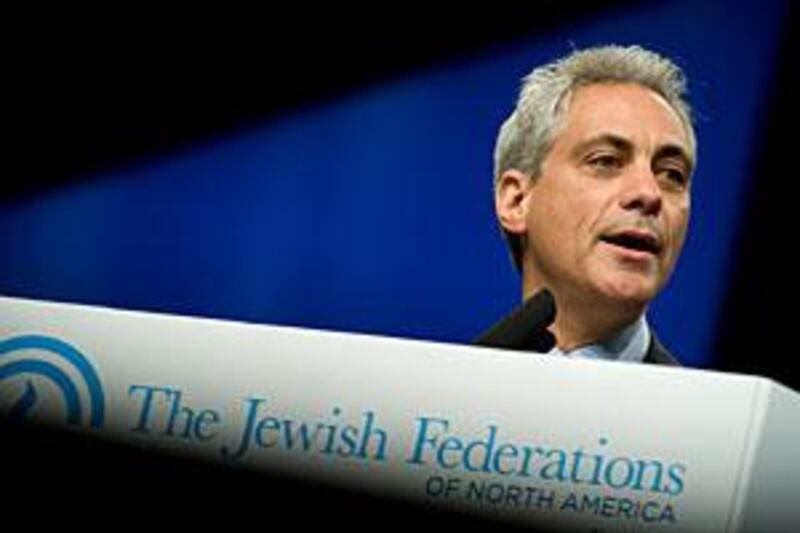WASHINGTON // Even as US-backed peace efforts in the Middle East appear to be losing momentum, the White House chief of staff, Rahm Emanuel, told American Jewish community leaders yesterday that the peace process has reached a critical juncture and that both sides should move forward immediately with negotiations. "This moment is fragile. History tells us that nothing stands still in the Middle East," Mr Emanuel, the son of an Israeli Jew, told the annual gathering of the Jewish Federations of North America, an umbrella group of more than 500 Jewish federations and communities.
"We must move forward and seize this opportunity, this moment that provides us with an opportunity to seek peace." Mr Emanuel called on Palestinians to condemn violence, recognise Israel's right to exist and to drop preconditions to peace talks. He also urged both sides to move past disagreements over Israeli settlement construction. Tensions have flared over the settlement issue, particularly in recent days, as many in the Arab world have accused the Obama administration of backtracking on its insistence that Israel halt all settlement activity.
"No one should allow the issue of settlements to distract from the overarching goal of a lasting peace between Israel, the Palestinians and the Arab world," Mr Emanuel said. His remarks come a day after Israel's prime minister, Benjamin Netanyahu, addressing the same audience, called for an "immediate" resumption of peace talks. "We need to move towards peace with a sense of urgency and a sense of purpose," said Mr Netanyahu, who later on Monday met with Barack Obama at the White House for talks on a broad range of regional security issues. "But to get a peace agreement, we must start negotiating. Let's stop talking about negotiations. Let's start moving."
In recent weeks, however, US-backed peace efforts in the region have stalled. Hillary Clinton, the secretary of state, roused Arab anger by praising Mr Netanyahu's offer of a partial settlement freeze - excluding several thousand residential units for which construction has already begun - as "unprecedented". She later clarified the statement by saying that the United States does not "accept the legitimacy of settlement activity", but the perceived reversal has undermined the leadership of Mahmoud Abbas, president of the Palestinian Authority, who last week said he had no "desire" to seek another term.
His credibility among Palestinians also was damaged after he reluctantly agreed to meet Mr Netanyahu in New York and then, under American and Israeli pressure, agreed to withdraw Palestinian support for a UN vote on a report that found evidence of possible war crimes by both Israel and Hamas in the recent war in Gaza. He has since reversed that position. Many also have pointed to possible emerging cracks in the relationship between Mr Obama and Mr Netanyahu.
The White House waited until late Sunday to confirm the meeting between the two heads of state in what some, particularly among the Israeli media, described as an effort by the administration to put pressure on Mr Netanyahu to change his approach. Visiting Israeli prime ministers typically - but not always - meet with the US president. Mr Netanyahu yesterday described his conversation with Mr Obama, which lasted about 40 minutes, as "a very focused and very positive", Reuters reported.
"I think this visit will turn out to have been very important," he said. Robert Gibbs, the White House press secretary, said yesterday the administration hoped the talks were "another step of progress". Mr Emanuel, for his part, said he was confident that Mr Netanyahu "understands deeply the strategic importance of moving this peace process forward". "We will continue to work closely together," he said of the US-Israel relationship.
Mr Emanuel appeared at the conference in place of Mr Obama, who cancelled to attend a memorial service in Fort Hood, Texas, for the 13 people who were killed last week in one of the worst mass shootings in US history. sstanek@thenational.ae





